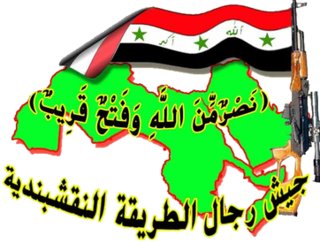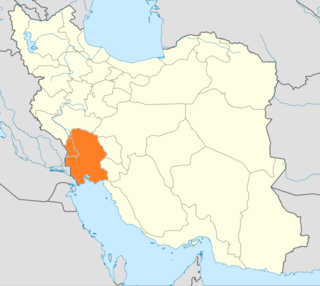Related Research Articles

Saddam Hussein was an Iraqi politician and revolutionary who served as the fifth president of Iraq from 1979 to 2003. He also served as prime minister of Iraq from 1979 to 1991 and later from 1994 to 2003. He was a leading member of the revolutionary Arab Socialist Ba'ath Party and later its Iraqi regional branch. Ideologically, he espoused Ba'athism, a mix of Arab nationalism and Arab socialism, while the policies and political ideas he championed are collectively known as Saddamism.

Abdul-Karim Qasim Muhammad Bakr al-Fadhli al-Zubaidi was an Iraqi military officer and nationalist who came to power in 1958 when the Iraqi monarchy was overthrown during the 14 July Revolution. He ruled the country as the prime minister until his downfall and execution during the 1963 Ramadan Revolution.

Ayad Allawi is an Iraqi politician. He served as the vice president of Iraq from 2014 to 2015 and 2016 to 2018. Previously he was interim prime minister of Iraq from 2004 to 2005 and the president of the Governing Council of Iraq in 2003.

An Iraqi insurgency began shortly after the 2003 American invasion deposed longtime leader Saddam Hussein. It is considered to have lasted until the end of the Iraq War and U.S. withdrawal in 2011. It was followed by a renewed insurgency.

After the 2003 invasion of Iraq was completed and the regime of Saddam Hussein was toppled in May 2003, an Iraqi insurgency began that would last until the United States left in 2011. The 2003–2006 phase of the Iraqi insurgency lasted until early 2006, when it escalated from an insurgency to a Sunni-Shia civil war, which became the most violent phase of the Iraq War.

The Islamic Army in Iraq was an underground Islamist militant organization formed in Iraq following the 2003 invasion of Iraq by U.S.-led Coalition forces, and the subsequent collapse of the Ba'athist regime headed by Saddam Hussein. IAI was regarded as one of the largest, sophisticated and most influential Sunni insurgent groups in Iraq that led an asymmetrical military insurgency against Coalition forces. The group became known for its grisly videos of kidnappings and attacks on U.S. and Iraqi troops.
Events in the year 2005 in Iraq.
The Reconciliation and Liberation Bloc or Kutla al-Musalaha wa't-Tahrir was an Iraqi political party. The Sunni, liberal, and secularist party was founded as the Iraqi Homeland Party in Jordan in 1995 by exiles from Saddam's regime. A prominent member was Saddam's son-in-law Hussein Kamel al-Majid. The party is closely linked to the powerful Juburi tribe and its current head is Mish'an al-Juburi. The party is also supported by former Ba'athists and the party has pushed for the reintegration of members of the old regime. Unlike many Sunni parties it decided not to boycott the January 2005 Iraqi election. In the voting it received some 31,000 votes, enough for one seat in the legislature. During the subsequent December elections, it increased its representation to 3 seats.

The 1920 Revolution Brigades was a Sunni militant group in Iraq, which included former members of the disbanded Iraqi army. It was established by the members of the former Ba'ath army of Saddam Hussein in 2003 following the American invasion. The group had used improvised explosive devices, and armed attacks against U.S.-led Coalition forces and comprises the military wing of the Islamic Resistance Movement. The group was named in reference to the Iraqi revolt of 1920.
Jeish Muhammad is an Iraqi militant group that is both politically and religiously motivated. The politically motivated faction within JM is primarily made up of former Ba'athist members mainly from the Sunni region. Many who enjoyed special status during the leadership of Saddam Hussein were from Tikrit, which is in turn within an area of Iraq where the Arab population is mostly Sunni. People who generally hold the ex-vice-president, Izzat Ibrahim ad-Douri, in exceptionally high esteem were members of the security, intelligence and police forces from the previous government.
Sectarian violence in Iraq developed as a result of rising sectarian tensions between the different religious and ethnic groups of Iraq, most notably the conflict between the Shi'i Muslim majority and the Sunni Muslim minority within the country.

The 1991 Iraqi uprisings were ethnic and religious uprisings against Saddam Hussein's regime in Iraq that were led by Shia Arabs and Kurds. The uprisings lasted from March to April 1991 after a ceasefire following the end of the Gulf War. The mostly uncoordinated insurgency was fueled by the perception that Iraqi President Saddam Hussein had become vulnerable to regime change. This perception of weakness was largely the result of the outcome of the Iran–Iraq War and the Gulf War, both of which occurred within a single decade and devastated the population and economy of Iraq.

After World War I, Iraq passed from the failing Ottoman Empire to British control. Kingdom of Iraq was established under the British Mandate in 1932. In the 14 July Revolution of 1958, the king was deposed and the Republic of Iraq was declared. In 1963, the Ba'ath Party staged a coup d'état and was in turn toppled by another coup in the same year, but managed to retake power in 1968. Saddam Hussein took power in 1979 and ruled Iraq for the remainder of the century, during the Iran–Iraq War of the 1980s, the Invasion of Kuwait and the Gulf War of 1990 to 1991 and the UN sanction during the 1990s. Saddam was removed from power in the 2003 invasion of Iraq.

Ba'athist Iraq, officially the Iraqi Republic (1968–1992) and later the Republic of Iraq (1992–2003), was the Iraqi state between 1968 and 2003 under the rule of the Arab Socialist Ba'ath Party. This period began with high economic growth, but ended with the country facing severe levels of socio-political isolation and economic stagnation. By the late 1990s, the average annual income had decreased drastically due to a combination of external and internal factors. UNSC sanctions against Iraq, in particular, were widely criticized for negatively impacting the country's quality of life, prompting the establishment of the Oil-for-Food Programme. The Ba'athist period formally came to an end with the 2003 invasion of Iraq, and the Ba'ath Party has since been indefinitely banned across the country.

Iraqi nationalism is a form of nationalism that asserts the belief that Iraqis form a nation and promotes the cultural unity of Iraqis of different ethnoreligious groups such as Mesopotamian Arabs, Kurds, Turkmens, Assyrians, Yazidis, Mandeans, Shabaks and Yarsans.

The Army of the Men of the Naqshbandi Order (Arabic: جيش رجال الطريقة النقشبندية Jaysh Rijāl aṭ-Ṭarīqa an-Naqshabandiya), (JRTN) also called the Naqshbandi Army, is one of a number of underground Ba'athist militant insurgency groups fighting U.S.-led Coalition forces in Iraq. Media frequently refers to the group by the initials JRTN, a romanization of its Arabic name. Supreme Command for Jihad and Liberation, technically the name of the umbrella organisation to which JRTN belongs, is also often used to refer to JRTN specifically.

The Arab Socialist Ba'ath Party – Iraq Region, officially the Iraqi Regional Branch, is an Iraqi Ba'athist political party founded in 1951 by Fuad al-Rikabi. It was the Iraqi regional branch of the original Ba'ath Party, before changing its allegiance to the Iraqi-dominated Ba'ath movement following the 1966 split within the original party. The party was officially banned following the American invasion of Iraq in 2003, but despite this it still continues to function underground.

Ra'ad Majid Rashid al-Hamdani is a retired Iraqi military officer and former General of the Iraqi Republican Guard, and was one of Saddam Hussein's favourite generals.

Arab separatism in Khuzestan was a decades-long separatist Arab movement in the western part of the Khuzestan Province in Iran.

The General Military Council for Iraqi Revolutionaries, was an Ba'athist militant group in Iraq headed by Saddam Hussein-era military and political leaders. It was described by Al Jazeera as "one of the main groups" in the Iraqi insurgency.
References
- ↑ Free Officers and Civilians Movement, GlobalSecurity, 2005-06-22
- ↑ Iraqi opposition to Saddam Hussein Archived 2016-04-16 at the Wayback Machine , al-Bab